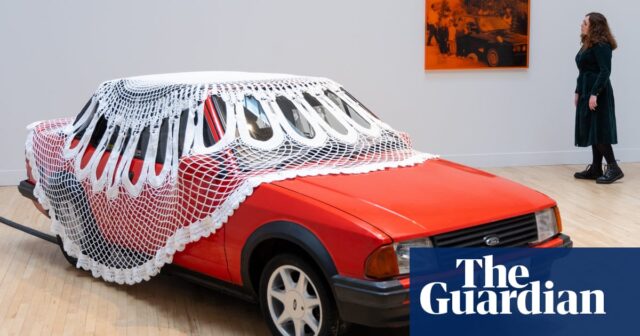Jasleen Kaur has won the 2024 Turner prize for her work animating everyday objects to reflect the pluralities of identity and community.
Kaur, 38, the youngest artist on this year’s shortlist, was nominated for her exhibition Alter Altar, at Tramway in Glasgow, which featured a range of sculptures and soundscapes.
Among the items included was a red Ford Escort covered in a huge doily, a reference to her father’s first car and to Indians who migrated to Britain and worked in textile factories.
Actor James Norton presented the award to Kaur on Tuesday night at a ceremony at Tate Britain, marking the prize’s return to the venue after six years. She will receive £25,000 in prize money.
Kaur was commended for the considered way she wove together the personal, political and spiritual in her work, creating a visual and aural experience that evoked solidarity and joy. The jury praised her ability to gather different voices through playful combinations of materials, from Irn-Bru bottles to family photographs.
Her exhibition featured worship bells, Sufi Islamic devotional music, Indian Harmonium, and pop tracks. Meanwhile, an acrylic “sky” littered with everyday ephemera was suspended over an oversized Axminster carpet.
The jury said Kaur’s work was alive to timely issues, “speaking imaginatively to how we might live together in a world increasingly marked by nationalism, division and social control”.
Alex Farquharson, the director of Tate Britain and jury chair, paid tribute to Kaur’s ability to “create amazing, enchanted environments out of the most prosaic objects”.
He said there was “a sense of life” to the objects, which “move from the specifics of Kaur’s own background to big diasporic themes of cross-cultural identity, specifically South Asian and Scottish, and within that Sikh and secular”.
Kaur grew up in Glasgow’s Sikh community in Pollokshields and has previously described her practice as “making sense of what is out of view or withheld”.
The Turner prize, regarded as one of the art world’s most prestigious awards, is presented to an artist born or working in Britain for an outstanding exhibition or presentation of their work over the previous year.
This year’s shortlist was dominated by themes of colonialism, nationalism and identity politics, and reflected the increased representation of BAME artists in museum and gallery shows after the Black Lives Matter movement.
Farquharson said Kaur’s work “opens up new ways of thinking about British identity through the language of contemporary art”.
The other shortlisted nominees were Claudette Johnson, Pio Abad, and Delaine Le Bas, who will receive £10,000 each.
Johnson, 65, was nominated for her solo show Presence, at the Courtauld Gallery in London and Ortuzar Projects in New York, which included a portrait of the slavery abolitionist Sarah Parker Remond that was commissioned as part of the Guardian’s Cotton Capital series.
She is the latest black female artist who emerged in the Black Art Movement of the 1980s to be recognised by the Turner prize, following in the footsteps of Lubaina Himid (2017 winner) and Veronica Ryan (2022), while Ingrid Pollard and Barbara Walker have both been nominated.
Abad, 41, a Filipino artist based in London, was nominated for his solo exhibition To Those Sitting in Darkness at the Ashmolean Museum in Oxford, which took its title from a Mark Twain essay critiquing American imperialism in the artist’s homeland of the Philippines.
His show also contained references to the Benin bronzes, after Abad discovered that the punitive expedition of 1897 – during which British troops sacked Benin City and looted thousands of objects – set off from his home, Woolwich, in south London.
Le Bas, 59, an artist of Romani heritage, received a nomination for her exhibition at the Vienna Secession, which included immersive performance art, theatrical costumes and sculptures.
Alongside Farquharson, the Turner prize 2024 jury included Rosie Cooper, director of Wysing Arts Centre; Ekow Eshun, writer, broadcaster and curator; Sam Thorne, director general and CEO at Japan House London; and Lydia Yee, curator and art historian.
Previous winners of the Turner prize have gone on to become household names, including Grayson Perry, Damien Hirst and Steve McQueen. Last year’s winner, Jesse Darling, was praised for his sculptures made up of faded union jack bunting and metal pedestrian barriers.
A group show of this year’s shortlisted artists work is running at Tate Britain until 16 February 2025. Next year the prize will be presented in Bradford at Cartwright Hall Art Gallery, marking the 250th anniversary of JMW Turner’s birth.






